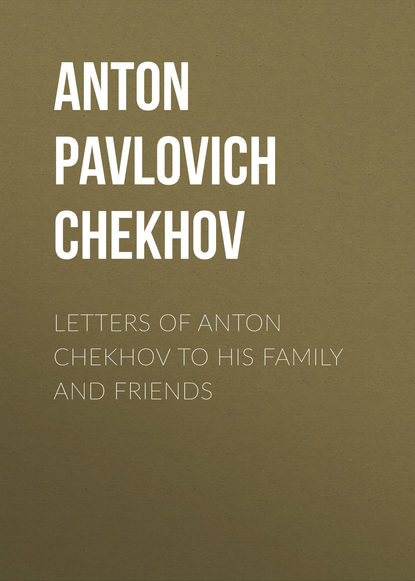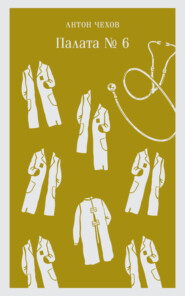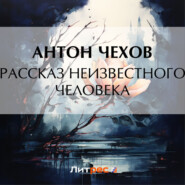По всем вопросам обращайтесь на: info@litportal.ru
(©) 2003-2024.
✖
Letters of Anton Chekhov to His Family and Friends
Настройки чтения
Размер шрифта
Высота строк
Поля
I answer you, dear Alexey Nikolaevitch, at once on receiving your letter. It was your name-day, and I forgot it!! Forgive me, dear friend, and accept my belated congratulations.
Did you really not like the “Kreutzer Sonata”? I don’t say it is a work of genius for all time, of that I am no judge; but to my thinking, among the mass of all that is written now, here and abroad, one scarcely could find anything else as powerful both in the gravity of its conception and the beauty of its execution. To say nothing of its artistic merits, which in places are striking, one must be grateful to the novel, if only because it is keenly stimulating to thought. As one reads it, one can scarcely refrain from crying out: “That’s true,” or “That’s absurd.” It is true it has some very annoying defects. Apart from all those you enumerate, it has one for which one cannot readily forgive the author – that is, the audacity with which Tolstoy holds forth about what he doesn’t know and is too obstinate to care to understand. Thus his statements about syphilis, foundling hospitals, the aversion of women for the sexual relation, and so on, are not merely open to dispute, but show him up as an ignoramus who has not, in the course of his long life, taken the trouble to read two or three books written by specialists. But yet these defects fly away like feathers in the wind; one simply does not notice them in face of the real worth of the story, or, if one notices them, it is only with a little vexation that the story has not escaped the fate of all the works of man, all imperfect and never free from blemish.
My Petersburg friends and acquaintances are angry with me? What for? For my not having bored them enough with my presence, which has for so long been a bore to myself! Soothe their minds. Tell them that in Petersburg I ate a great many dinners and a great many suppers, but did not fascinate one lady; that every day I was confident of leaving by the evening train, that I was detained by my friends and by The Marine Almanack, the whole of which I had to look through from the year 1852. While I was in Petersburg, I got through in one month more than my young friends would in a year. Let them be angry, though!
I sit all day long reading and making extracts. I have nothing in my head or on paper except Sahalin. Mental obsession. Mania Sachalinosa.
Not long ago I dined with Madame Yermolov. [Translator’s Note: The celebrated actress.] A wild-flower thrust into the same nosegay with the carnation was the more fragrant for the good company it had kept. So I, after dining with the star, was aware of a halo round my head for two days afterwards …
Good-bye, my dear friend; come and see us…
TO A. S. SUVORIN
MOSCOW, February 23, 1890.
… My brother Alexandr is a slow-witted creature; he is enthusiastic over Ornatsky’s missionary speech, in which he says that the natives do not become Christians because they are waiting for a special ukaz (that is, command) from the Tsar on the subject and are waiting for their chiefs to be baptized … (by force – be it understood). This eloquent pontifex says, too, that the native priests ought, in view of their ascetic manner of life, to be removed from the natives and put into special institutions somewhat after the fashion of monasteries. A nice set of people and no mistake! They have wasted two million roubles, they send out every year from the academy dozens of missionaries who cost the treasury and the people large sums, yet they cannot convert the natives, and what is more, want the police and the military to help them with fire and sword…
If you have Madame Tsebrikov’s article, do not trouble to send it. Such articles give no information and only waste time; I want facts. Indeed, in Russia there is a terrible poverty of facts, and a terrible abundance of reflections of all sorts.
February 28
… To-morrow is spring, and within ten to fifteen days the larks will come back. But alas! – the coming spring seems strange to me, for I am going away from it.
In Sahalin there is very good fish, but there are no hot drinks…
Our geologists, ichthyologists, zoologists and so on, are fearfully uneducated people. They write such a vile jargon that it not only bores one to read it, but one actually has at times to remodel the sentences before one can understand them; on the other hand, they have solemnity and earnestness enough and to spare. It’s really beastly…
March 4
I have sent you to-day two stories: Filippov’s (he was here yesterday) and Yezhov’s. I have not had time to read the latter, and I think it is as well to say, once for all, that I am not responsible for what I send you. My handwriting on the address does not mean that I like the story.
Poor Yezhov has been to see me; he sat near the table crying: his young wife is in consumption. He must take her at once to the south. To my question whether he had money he answered that he had… It’s vile catch-cold weather; the sky itself is sneezing. I can’t bear to look at it… I have already begun writing of Sahalin. I have written five pages. It reads all right, as though written with intelligence and authority … I quote foreign authors second-hand, but minutely and in a tone as though I could speak every foreign language perfectly. It’s regular swindling.
Yezhov has upset me with his tears. He reminded me of something, and I was sorry for him too.
Don’t forget us sinners.
TO N. M. LINTVARYOV
MOSCOW, March 5, 1890.
… As for me, I have a cough too, but I am alive and I believe I’m well. I shan’t be with you this summer, as I am going in April, on affairs of my own, to the island of Sahalin, and shall not be back till December. I am going across Siberia (eleven thousand versts) and shall come back by sea. I believe Misha wrote to you as though someone were commissioning me to go, but that’s nonsense. I am commissioning myself to go, on my own account. There are lots of bears and escaped convicts in Sahalin, so that in case messieurs the wild beasts dine off me or some tramp cuts my throat, I beg you not to remember evil against me.
Of course if I have the time and the skill to write what I want to about Sahalin, I shall send you the book immediately that it comes into the world; it will be dull, a specialist’s book consisting of nothing but figures, but let me count upon your indulgence: you will suppress your yawns as you read it…
TO A. S. SUVORIN
MOSCOW, March 9.
About Sahalin we are both mistaken, but you probably more than I. I am going in the full conviction that my visit will furnish no contribution of value either to literature or science: I have neither the knowledge, nor the time, nor the ambition for that. I have neither the plans of a Humboldt nor of a Kennan. I want to write some 100 to 200 pages, and so do something, however little, for medical science, which, as you are aware, I have neglected shockingly. Possibly I shall not succeed in writing anything, but still the expedition does not lose its charm for me: reading, looking about me, and listening, I shall learn a great deal and gain experience. I have not yet travelled, but thanks to the books which I have been compelled to read, I have learned a great deal which anyone ought to be flogged for not knowing, and which I was so ignorant as not to have known before. Moreover, I imagine the journey will be six months of incessant hard work, physical and mental, and that is essential for me, for I am a Little Russian and have already begun to be lazy. I must take myself in hand. My expedition may be nonsense, obstinacy, a craze, but think a moment and tell me what I am losing if I go. Time? Money? Shall I suffer hardships? My time is worth nothing; money I never have anyway; as for hardships, I shall travel with horses, twenty-five to thirty days, not more, all the rest of the time I shall be sitting on the deck of a steamer or in a room, and shall be continually bombarding you with letters.
Suppose the expedition gives me nothing, yet surely there will be 2 or 3 days out of the whole journey which I shall remember all my life with ecstasy or bitterness, etc., etc… So that’s how it is, sir. All that is unconvincing, but you know you write just as unconvincingly. For instance, you say that Sahalin is of no use and no interest to anyone. Can that be true? Sahalin can be useless and uninteresting only to a society which does not exile thousands of people to it and does not spend millions of roubles on it. Except Australia in the past and Cayenne, Sahalin is the only place where one can study colonization by convicts; all Europe is interested in it, and is it no use to us? Not more than 25 to 30 years ago our Russians exploring Sahalin performed amazing feats which exalt them above humanity, and that’s no use to us: we don’t know what those men were, and simply sit within four walls and complain that God has made man amiss. Sahalin is a place of the most unbearable sufferings of which man, free and captive, is capable. Those who work near it and upon it have solved fearful, responsible problems, and are still solving them. I am not sentimental, or I would say that we ought to go to places like Sahalin to worship as the Turks go to Mecca, and that sailors and gaolers ought to think of the prison in Sahalin as military men think of Sevastopol. From the books I have read and am reading, it is evident that we have sent millions of men to rot in prison, have destroyed them – casually, without thinking, barbarously; we have driven men in fetters through the cold ten thousand versts, have infected them with syphilis, have depraved them, have multiplied criminals, and the blame for all this we have thrown upon the gaolers and red-nosed superintendents. Now all educated Europe knows that it is not the superintendents that are to blame, but all of us; yet that has nothing to do with us, it is not interesting. The vaunted sixties did nothing for the sick and for prisoners, so breaking the chief commandment of Christian civilization. In our day something is being done for the sick, nothing for prisoners; prison management is entirely without interest for our jurists. No, I assure you that Sahalin is of use and of interest to us, and the only thing to regret is that I am going there, and not someone else who knows more about it and would be more able to rouse public interest. Nothing much will come of my going there.
There have been disturbances among the students on a grand scale here. It began with the Petrovsky Academy, where the authorities forbade the students to take young ladies to their rooms, suspecting the ladies of politics as well as of prostitution. From the Academy it spread to the University, where now the students, surrounded by fully armed and mounted Hectors and Achilleses with lances, make the following demands:
1. Complete autonomy for the universities.
2. Complete freedom of teaching.
3. Free right of entrance to the university without distinction of religious denomination, nationality, sex, and social position.
4. Right of entrance to the university for the Jews without restriction, and equal rights for them with the other students.
5. Freedom of meeting and recognition of the students’ associations.
6. The establishment of a university and students’ tribunal.
7. The abolition of the police duties of the inspectors.
8. Lowering of the fees for instruction.
This I copied from a manifesto, with some abbreviations.
TO I. L. SHTCHEGLOV
MOSCOW, March 22, 1890.
My greetings, dear Jean! Thanks for your long letter and for the good will of which it is full from beginning to end. I shall be delighted to read your military story. Will it come out in the Easter number? It is a long time since I read anything of yours or my own. You say that you want to give me a harsh scolding “especially on the score of morality and art,” you speak vaguely of my crimes as deserving friendly censure, and threaten me with “an influential newspaper criticism.” If you scratch out the word “art,” the whole phrase in quotation marks becomes clearer, but gains a significance which, to tell the truth, perplexes me not a little. Jean, what is it? How is one to understand it? Can I really be different in my ideas of morality from people like you, and so much so as to deserve censure and even an influential article? I cannot take it that you mean some subtle higher morality, as there are no lower, higher, or medium moralities, but only one which Jesus Christ gave us, and which now prevents you and me and Barantsevitch from stealing, insulting, lying, and so on. If I can trust the ease of my conscience, I have never by word or deed, in thought, or in my stories, or in my farces, coveted my neighbour’s wife, nor his man, nor his ox, nor any of his cattle, I have not stolen, nor been a hypocrite, I have not flattered the great nor sought their favour, I have not blackmailed, nor lived at other people’s expense. It is true I have waxed wanton and slothful, have laughed heedlessly, have eaten too much and drunk too much and been profligate. But all that is a personal matter, and all that does not deprive me of the right to think that, as far as morals are concerned, I am nothing out of the ordinary, one way or the other. Nothing heroic and nothing scoundrelly – I am just like everyone else; I have many sins, but I am quits with morality, as I pay for those sins with interest in the discomforts they bring with them. If you want to abuse me cruelly because I am not a hero, you’d better throw your cruelty out of the window, and instead of abuse, let me hear your charming tragic laugh – that’s better.
But of the word “art” I am terrified, as merchants’ wives are terrified of “brimstone.” When people talk to me of what is artistic and inartistic, of what is dramatic and not dramatic, of tendency, realism, and so on, I am bewildered, hesitatingly assent, and answer with banal half-truths not worth a brass farthing. I divide all works into two classes: those I like and those I don’t. I have no other criterion, and if you ask me why I like Shakespeare and don’t like Zlatovratsky, I don’t venture to answer. Perhaps in time and as I grow wiser I may work out some criterion, but meanwhile all conversations about what is “artistic” only weary me, and seem to me like a continuation of the scholastic disputations with which people wearied themselves in the middle ages.
If criticism, on the authority of which you rely, knows what you and I don’t know, why has it up till now not spoken? why does it not reveal the truth and the immutable laws? If it knew, believe me, it would long ago have shown us the true path and we should have known what to do, and Fofanov would not have been in a madhouse, Garshin would have been alive to-day, Barantsevitch would not have been so depressed and we should not be so dull and ill at ease as we are, and you would not feel drawn to the theatre and I to Sahalin. But criticism maintains a dignified silence or gets out of it with idle trashy babble. If it seems to you authoritative it is because it is stupid, conceited, impudent, and clamorous; because it is an empty barrel one cannot help hearing.
But let us have done with that and sing something out of a different opera. Please don’t build any literary hopes on my Sahalin trip. I am not going for the sake of impressions or observations, but simply for the sake of living for six months differently from how I have lived hitherto. Don’t rely on me, old man; if I am successful and clever enough to do something, so much the better; if not, don’t blame me. I am going after Easter. I will send you in due time my Sahalin address and minute instructions…
TO A. S. SUVORIN
MOSCOW, March 22, 1890.
… Yesterday a young lady told me that Professor Storozhenko had related to her the following anecdote. The Sovereign liked the Kreutzer Sonata. Pobyedonostsev, Lubimov, and the other cherubim and seraphim, hastened to justify their attitude to Tolstoy by showing his Majesty “Nikolay Palkin.” After reading it, his Majesty was so furious that he ordered measures to be taken. Prince Dolgorukov was informed. And so one fine day an adjutant from Dolgorukov comes to Tolstoy and invites him to go at once to the prince. The latter replies: “Tell the prince that I only visit the houses of my acquaintances.” The adjutant, overcome with confusion, rides away, and next day brings Tolstoy the official notice demanding from him an explanation in regard to his “Nikolay Palkin.” Tolstoy reads the document and says:
“Tell his excellency that I have not for a long time past written anything for publication; I write only for my friends, and if my friends spread my writings abroad, they are responsible and not I. Tell him that!”
“But I can’t tell him that,” cried the adjutant in horror, “the prince will not believe me!”
“The prince will not believe his subordinates? That’s bad.”
Two days later the adjutant comes again with a fresh document, and learns that Tolstoy has gone away to Yasnaya Polyana. That is the end of the anecdote.

















